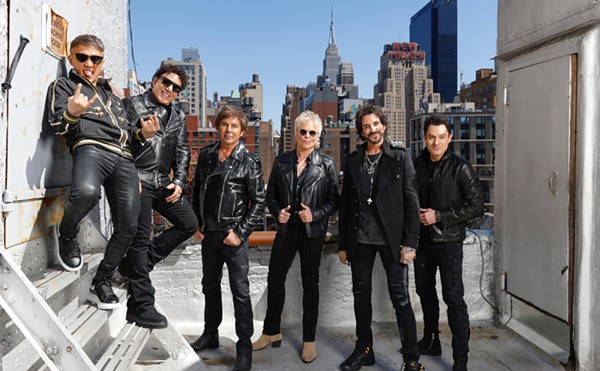Nyabinghi Dance Hall, Youngstown
October 25
Just about everything that could go wrong did go wrong for Uz Jsme Doma, a band from the Czech Republic that was making its first appearance in Youngstown. For starters, the turnout at the club -- which, by the way, has one of the best jukeboxes in Northeast Ohio (assuming you like bands such as the Jesus Lizard, Brainiac, and Queens of the Stone Age) -- was nothing short of dismal. Few, if any, of the 20 or so patrons appeared to have come explicitly to see the group. And then, once the band started playing shortly after midnight, it ran into a series of technical problems. A guitar string broke and a cymbal fell apart, creating delays that nearly caused what little audience was there to dissipate.
But then, Uz Jsme Doma has a history of dealing with difficult circumstances. When the band first formed 15 years ago, the Czech Republic was still under communist rule, and most of Uz Jsme Doma's shows, which were completely underground affairs, were accordingly broken up by police. The group sneaked out to Poland to play a festival, but had to do so secretly.
Now, of course, Uz Jsme Doma is free to travel and has toured the U.S. several times since 1995, the year that Washington, D.C.-based Skoda Records began reissuing the band's catalog. Led by singer-guitarist Miroslav Wanek, the ensemble -- which includes saxophonist Jindra Dolansky, guitarist Radek Podvesky, drummer Petr Bohm, and bassist Jan Cejka -- played a mixture of jazz and rock, and adroitly breezed through a series of mind-boggling time changes. On "Kouzelnik (Magician)," perhaps one of the best songs in the band's repertoire, the group started with gargling chants before breaking into an anthemic chorus.
Emphasizing material from its new album, Usi (Ears), the band, which sings all its lyrics in Czech, actually won over much of the small crowd with its unique delivery (the schizophrenic nature of its live performances is similar to that of American bands like Mr. Bungle and the Residents). Even the double-fisted drunk, who clashed his beers together until one of the bottles shattered, was impressed by Uz Jsme Doma and made some slurred pronouncement about music being universal. And, in a way, he was right. -- Jeff Niesel
Meridian Arts Ensemble
Cleveland Museum of Art
October 28
The Meridian Arts Ensemble, a brass quintet with a percussionist, gave an unusual chamber music performance at the Cleveland Museum of Art. Most ensembles of this type perform classical music almost exclusively. And when the group was formed, a dozen years ago, its members assumed that's what they'd be doing as well. But as time went on, they found a solely classical repertoire limiting and began to draw on other genres for their material.
Their work has been anticipated by Les Miserables Brass Band, a group composed of academically trained musicians who play arrangements of various types of popular music, but there certainly aren't many groups around like Meridian in the chamber music field. In fact, they've made it a policy to commission challenging new works and rearrange older ones to suit their purposes.
Consider what they played last week: "Migration," by the group's French horn player, Daniel Grabois, uses motives from a Franz Schubert song, but has been modernized so that it sounds like a 20th-century work. "Nansi Imali," a South African piece, has been performed by Ladysmith Black Mambazo. Tania Leon's "Saoko" has a Cuban influence. David Sanford's "Corpus" is built on the cantata structure. John Halle's "By All Means" and Tomas Granet's "Little Buddha" might be thought of as "third stream" classical influences. Su Lian Tan's "Moo Shu Wrap Rap" is Chinese hip-hop, and Jason Forsythe's "Sanctity" is a pretty, spiritual-like piece. Finally, a medley of Frank Zappa's works were performed, which were arranged with Zappa's suggestions and approval.
Technically, Meridian's performance was balanced, nuanced, and accurate. The brass players employed techniques not often used by classical brassmen, including multiphonics, smears, glissandi, and growls. Trombonist Benjamin Herrington displayed impressive chops, played cleanly in all registers, and produced a full, warm sound. Tubist Marcus Rojas, the backbone of the group, displayed rock-steady time, unforced power, and a broad, mellow tone. There was even some nice, improvised work by trumpeter Chuck Lazarus.
All of the selections were at least pleasing, although some were lightweight. The Zappa interpretations emphasized the influence Var&eagrave;se and Stravinsky had on him. The main thing, though, is that Meridian is stretching the limits and possibilities for brass players and blurring the boundaries between various forms of music, which are artificial in any case. -- Harvey Pekar
MxPx
Odeon
October 26
After a decade of commercialization, punk rock still has a thriving underground, and there are a number of bands who can pack venues without the help of commercial radio or MTV. Despite having a record on a major label (the recent live effort At the Show), MxPx falls into that select category with its unyielding, raw brand of post-Green Day punk.
But unlike Green Day, MxPx keeps the punk rock ethos alive without littering its music with too many pop hooks. Its style is hard yet not hardcore, and the songs are melodic without being overt about it. In fact, since its formation six years ago, MxPx has maintained a level of integrity that has given it a die-hard, NOFX-like following.
Punk's popularity might be waning, but for just over an hour, MxPx played an unrelenting set of angst-ridden tunes that turned the packed, sweaty Odeon into a giant mosh pit last week. Band members are barely drinking age (the group formed when they were all still in high school), and their crowd was just as young. But despite the tattoos and attitude, MxPx wasn't exactly what it seemed. This Bremerton, Washington-based band was really the antithesis of the Sex Pistols, because underneath the raw, garage rock of tracks like "Walking By" was a message that was essentially conservative and likely went right over the body-surfing crowd's heads.
While their 1996 "hit" "Chick Magnet" was innocent enough, other songs weren't. "Just know this/That God is faithful," sang singer-bassist Mike Herrera during "Tomorrow's Another Day," but it's likely that his message was drowned out by the blaring guitars and thumping drums -- and, to be honest, it's probably best that it was. -- John Benson








![Mourning [A] BLKstar.](https://media1.clevescene.com/clevescene/imager/clevelands-mourning-a-blkstar-returns-with-sophisticated-suite-of-new-songs/u/golden-s/44709952/screen_shot_2024-07-12_at_10.18.29_am.png?cb=1720806957)



